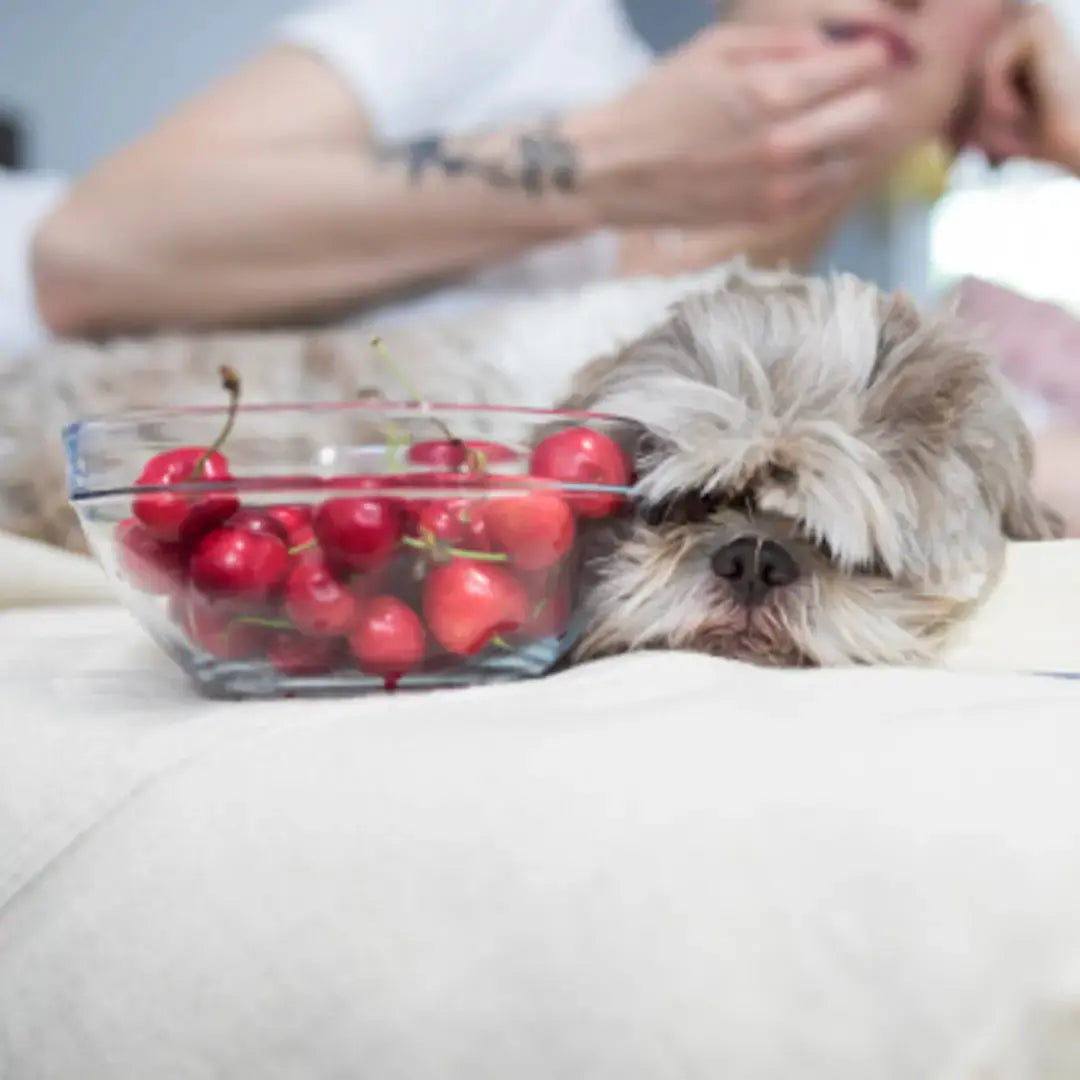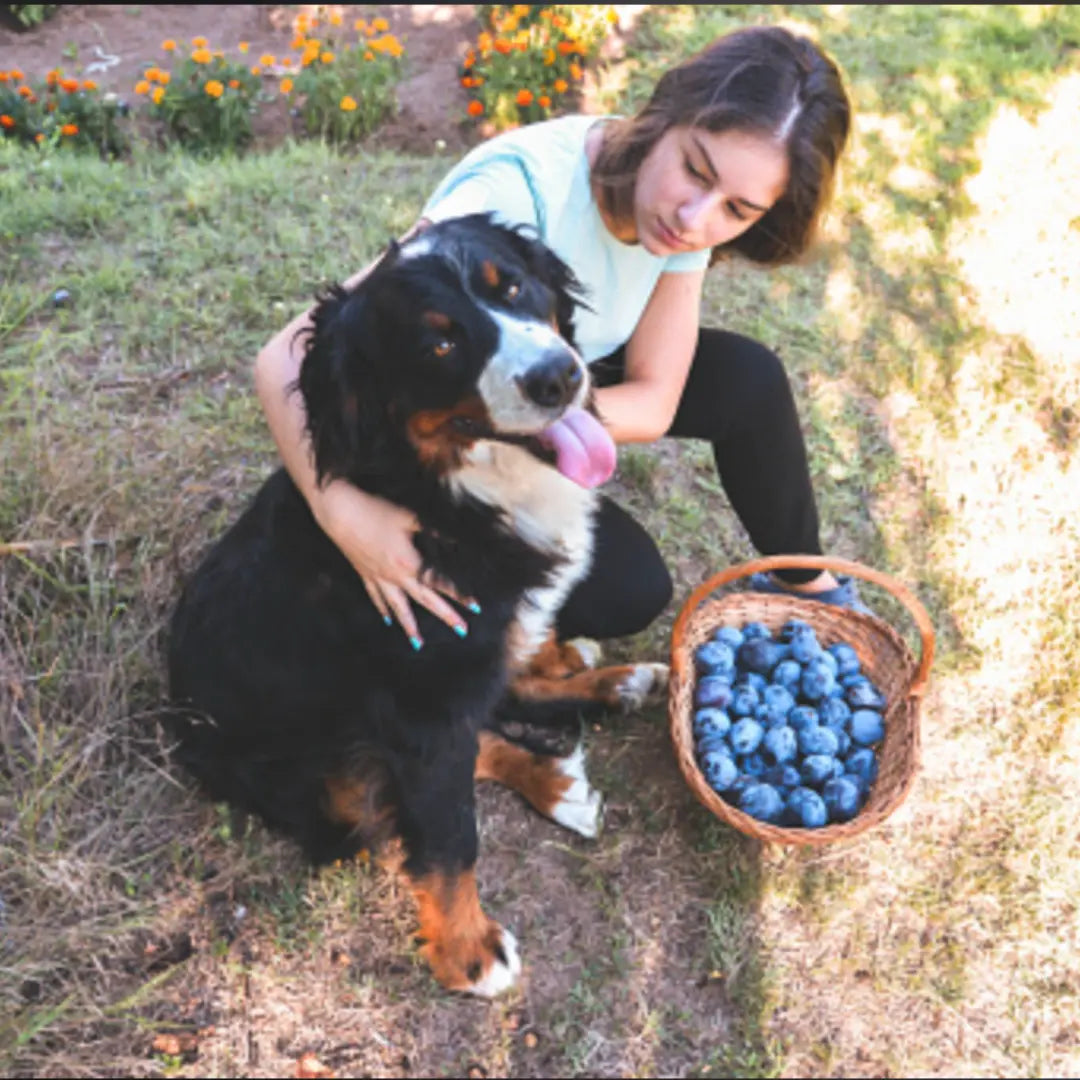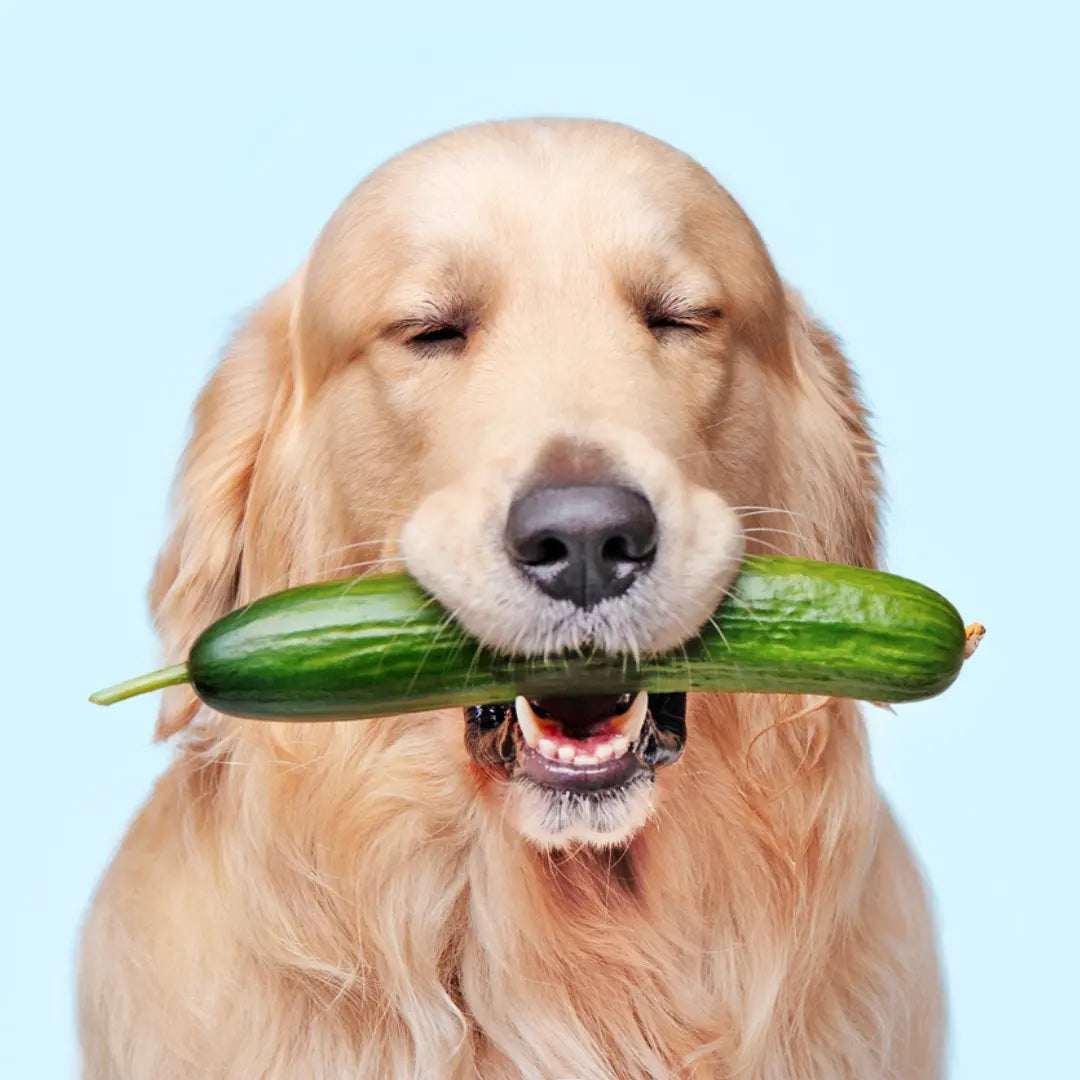Can a dog eat cherries?
As a dog parent, it’s natural to want to share your food with your dog but you wonder what you can and cannot give them. After all, their health and safety are two of the most important things to you. And if you’re someone who loves to snack on cherries, you may be wondering if it's safe for your pup to eat them too. Well, the answer isn’t black and white. There are several things to consider before letting your dog indulge in these sweet treats. In this article, we will answer the question: Can dogs eat cherries?
The answer is yes and no; dogs should not eat whole cherries, but cherries without pits and stems are fine. This is because cherries contain a substance called cyanide, which is poisonous to dogs, that is found in some parts of the cherry, like the cherry pit, stem, and leaves. If your dog has consumed anything containing cherries, it’s best to keep an eye out for any symptoms of poisoning. These may include dilated pupils, difficulty breathing, and vomiting.
If you want to give your pup a taste of cherries, there are options available that are safe for dogs. You can give them frozen cherries or fresh cherries that have been completely pitted and stemmed. However, it’s important to note that even these safe options should only be given in moderation.
Are cherries bad for dogs? Are cherries bad for a dog? Are cherries safe for dogs?
Cherries are a popular fruit, especially during summer, and it’s essential to know why they’re on the list of fruits that need extra caution when feeding to our pups.
Avoid Cherry Pits At All Costs
Cherry pits contain cyanide, which is toxic to dogs. It can cause cyanide poisoning, which can lead to severe health complications or death when ingested in large quantities. The cyanide can cause oxygen deprivation to the dog’s blood cells, leading to breathing and heart problems, which can be fatal. If a cherry pit accidentally falls on the ground, make sure to pick it up immediately to prevent your dog from eating it. The cherry pit can also cause intestinal obstruction/intestinal blockage and can be a choking hazard.
You may be wondering what cyanide poisoning looks like in dogs...
- What is cyanide, and how do dogs come into contact with it?
Cyanide is a potent and highly toxic chemical that can cause harm to both humans and animals. The toxic compound is often found in certain foods, plants, and chemicals used in industrial or household settings. Dogs may come into contact with cyanide through various sources such as contaminated water, wild berries, seeds, pits of certain fruits, and chemicals commonly found in fertilizers and pesticides.
- Signs and symptoms of cyanide poisoning in dogs
The signs of cyanide poisoning in dogs may vary depending on the amount and the mode of ingestion of the toxic substance. Some of the common signs and symptoms of cyanide poisoning in dogs include panting, dilated pupils, vomiting, diarrhea, difficulty breathing, seizures, and collapse. In severe cases, dogs may experience rapid heart rate, coma, and even death.
- What to do in case of cyanide poisoning in dogs?
If you suspect that your dog has ingested cyanide, it is essential to seek prompt medical attention. Time is of the essence when it comes to cyanide poisoning, and immediate treatment can make a significant difference in your dog's chances of recovery. Call your veterinarian or an animal poison control center immediately and describe the symptoms and the possible mode of ingestion. Depending on the severity of the poisoning, your veterinarian may recommend inducing vomiting, administering activated charcoal, or providing oxygen therapy.
- How to prevent cyanide poisoning in dogs?
Preventing cyanide poisoning in dogs is essential, and dog parents can take several precautions to ensure their pets' safety. Some of the preventive measures include avoiding exposure to wild plants and berries, safely storing household chemicals and cleaning products, and keeping away from fertilizers and pesticides. Additionally, keeping a watchful eye on your furry friend's eating habits and where they go outside can help prevent accidental ingestion of toxic substances.
The High Sugar Content In Cherries Can Cause Health Problems
Fruits, in general, contain natural sugar, and cherries are no exception. Cherries have high sugar content, and consuming a significant amount can lead to gastrointestinal issues such as diarrhea, vomiting, and upset stomach. Dogs with obesity or diabetes must always be cautious when consuming sweet fruits like cherries, as they can aggravate their current health conditions.
Cherry juice and dried cherries may also pose risks to dogs. Cherry juice is often high in sugar and may contain artificial sweeteners like xylitol, which can cause liver failure in dogs. Dried cherries can be high in calories and sugar, leading to obesity and other health issues.
The Stems and Leaves of Cherries Can Be Harmful To Your Dog
Cherry stems and leaves contain cyanide, just like the pits, and when ingested, it can cause severe health complications. Cyanide from the stems and leaves can also cause mild to severe symptoms, such as coughing, vomiting, and difficulty breathing. It’s essential to keep cherries away from your furry friend, including the stems and leaves.
Not All Dogs Can Digest Fruits Properly
Dogs have different digestive systems, and some breeds may not be able to tolerate fruits, including cherries. Digestive tract complications can occur, and dogs may exhibit symptoms such as bloating, gas, constipation, and diarrhea. It’s essential to observe your dog after consuming cherries, and if any unusual symptoms occur, contact your vet immediately.
It’s Essential To Keep Cherries Out Of Reach
Cherries are easy to access during the summer season, whether it’s from the grocery store or a local farmer’s market. If you have a cherry tree in your backyard, make sure to create boundaries or fencing to restrict your dog’s access. It’s crucial to keep cherries out of your dog’s reach to prevent accidental ingestion.
Cherries are Good for Dogs
Despite the risks, cherries do offer some health benefits for dogs. They are a good source of vitamin C, antioxidants, fiber, vitamin A, and potassium, which can help boost your dog's immune system, aid digestion, and support overall health. However, it is still important to exercise caution when adding cherries to your dog’s food.
When it comes to feeding cherries to your dog, the best option is to err on the side of caution. Instead of feeding him whole cherries, you can opt for homemade cherry dog treats.
Can I feed my dog Sweet Cherries? - YES
Sweet cherries are one of the most common types of cherries that we consume. These delicious fruits are usually eaten as a snack, used in desserts, or added to smoothies. Can dogs eat sweet cherries? The answer is yes, but you have to be very careful. Sweet cherries are not toxic to dogs, but they do contain sugar, which can lead to obesity and dental problems. Also, make sure to remove the pits and stems, as they can lead to choking hazards and cyanide toxicity.
Can I feed my dog Wild Cherries? - NO
Wild cherries, also known as bitter cherries, chokecherries, or Virginia cherries, are a different story. These cherries contain a toxin called cyanogenic glycosides that cause serious health issues in dogs, including kidney failure, seizures, and even death. Therefore, it is best to keep your dog away from wild cherries.
Can I feed my dog Maraschino Cherries? - NO
Maraschino cherries are a popular garnish in cocktails, desserts, and other food items. However, they are bad for dogs. These cherries contain high levels of sugar, preservatives, artificial colorings and flavors that can lead to health issues such as obesity, diabetes, and digestive problems. It is best to keep maraschino cherries away from your furry friend.
Can I feed my dog Cherry Tomatoes? - YES
Cherry tomatoes are not true cherries, but a type of tomato. They are usually used in salads, sandwiches, and pasta dishes. But are they safe for dogs? The answer is yes, but in small amounts. Cherry tomatoes are not toxic to dogs, but they do contain solanine, a compound that can cause gastrointestinal issues and long-term health problems if consumed in large amounts. So, it is best to feed your pup ripe cherry tomatoes in moderation.
Can I feed my dog Frozen Cherries? - YES
Frozen cherries can be a refreshing treat for your furry friend on a hot summer day. Also, frozen cherries are high in sugar, so it is essential to feed them in moderation. Overeating can lead to weight gain, diabetes, and other health problems.
Are cherries safe for dogs?
Yes! As long as there are no pits or stems then it’s perfectly safe for your pup to eat it. There are lots of fruits that our dogs can eat, but some stems and peels can be dangerous for them. Learn more about what fruit peels your dog can or can’t eat with our blog.
Cherry Treat Recipe for Dogs
Another great recipe is our Beef Liver & Berry Treats! Find the recipe here.
Why cook for your dog?
Cooking homemade meals for your dog offers numerous benefits. It allows you to control the nutritional content of their food, ensuring they receive all the necessary nutrients tailored to their needs. By using fresh ingredients, you avoid preservatives and low-quality ingredients commonly found in commercial dog food. Additionally, cooking provides a wider variety of tastes, textures, and health benefits, enhancing the bond between you and your furry friend. It can also be cost-effective in the long run, especially when buying ingredients in bulk and accommodating special dietary requirements. Furthermore, homemade meals contribute to overall better health, addressing conditions like dental problems, obesity, allergies, and digestive issues. Ultimately, cooking for your dog is a way to demonstrate your love and care.  With Dog Child, you have full control over your dog’s meals without the stress of worrying if they are getting the nutrients they need. We have 2 Meal Mix flavors to choose from: Oats & Berry and Mixed Veggie. All of these have all the nutrients that your pup needs to live a healthy life. If you rather add nutrients to their current food, our Essential Nutrient Mix is the perfect option that you can add to your dog’s current diet.
With Dog Child, you have full control over your dog’s meals without the stress of worrying if they are getting the nutrients they need. We have 2 Meal Mix flavors to choose from: Oats & Berry and Mixed Veggie. All of these have all the nutrients that your pup needs to live a healthy life. If you rather add nutrients to their current food, our Essential Nutrient Mix is the perfect option that you can add to your dog’s current diet.
Conclusion
In conclusion, cherries aren’t toxic to dogs, but they can be risky if consumed in large amounts or with pits. As with any new food, it’s important to introduce cherries to your dog's diet slowly and in moderation. Pay attention to your dog’s reactions, and always remove the pits before feeding them cherries. With a little care and attention, you can safely share some delicious fruits with your furry friend!
FAQs
Are cherries safe for dogs?
Yes, as long as the pit and stem aren’t being fed to your dog.
Are there any health benefits to feeding cherries to my dog?
Cherries are a great source of vitamins A and C, melatonin, antioxidants, fiber, and potassium.
Which types of cherries are safe to feed my dog?
Sweet cherries or fresh cherries, and frozen cherries are healthy and safe options for your pup.




